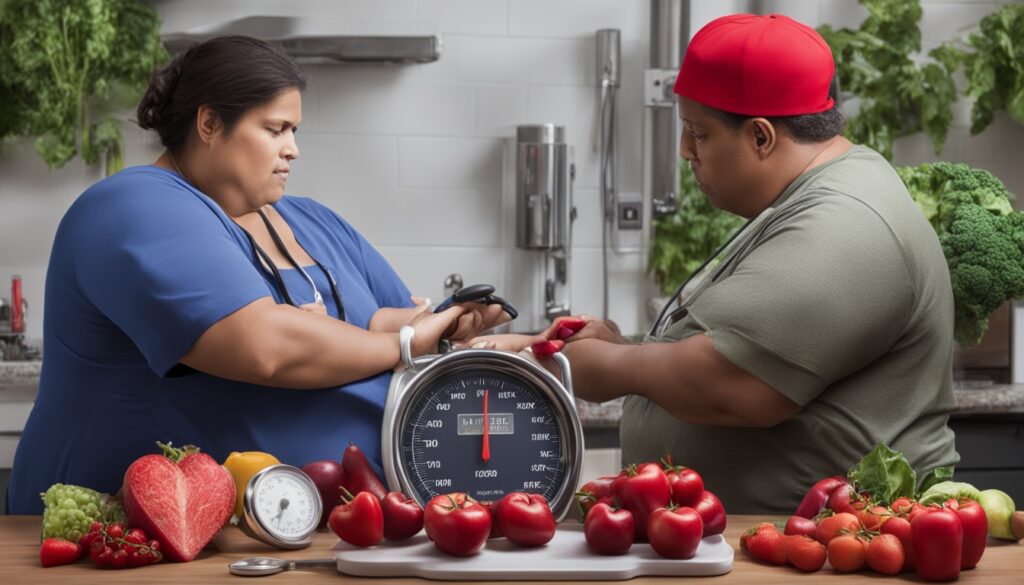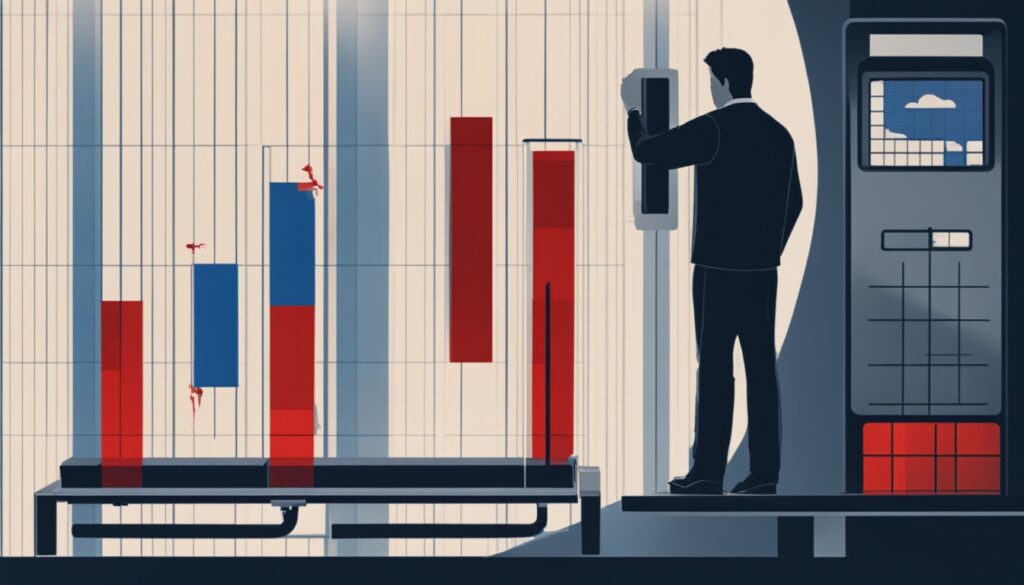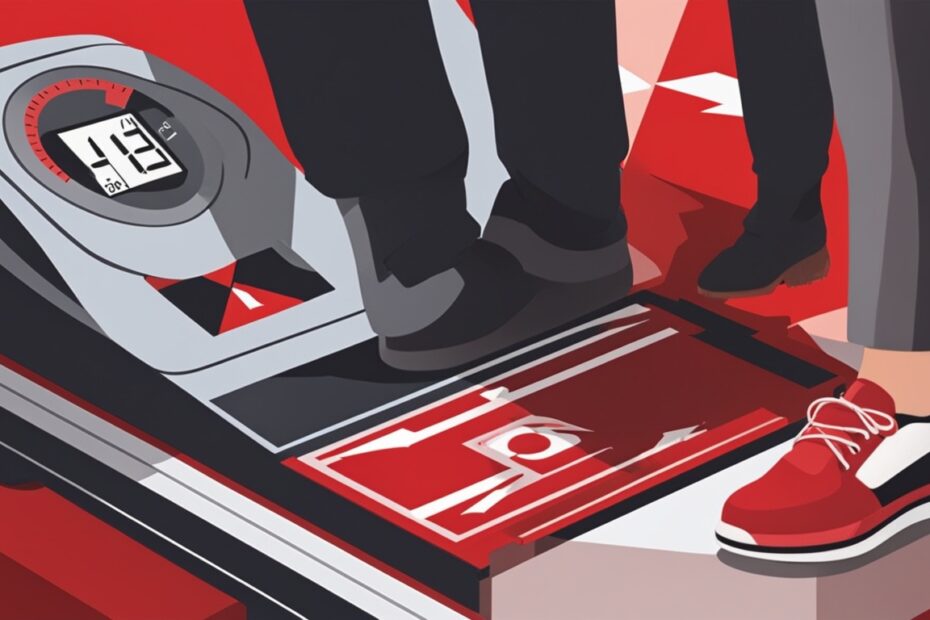I often think about how losing weight relates to blood pressure. Being someone who’s had weight issues, I wonder: can losing weight raise blood pressure? It’s a big question, and I’m ready to talk about it and this impact on our health.
We know that being obese can raise blood pressure. This is because extra weight makes our hearts work harder. But hold on: shedding just 5-10 pounds can really help lower it. For instance, overweight people with high blood pressure saw it drop when they lost 10% of their weight.
But, losing weight too fast can sometimes make blood pressure go up for a bit. So, it’s best to take it slow and easy. I try to lose 1-2 pounds every week. I eat well and move a lot. This gentle approach doesn’t just help with my blood pressure. It’s good for my body all around.
The Relationship Between Weight and Blood Pressure
Weight is very important for our heart health. Being obese can lead to high blood pressure. So, it’s key to know how our weight impacts our blood pressure.
Excess Weight and Heart Health
Having extra weight is tough for our heart and blood vessels. It can cause high blood pressure, raising the chance of heart disease.

Obesity and Hypertension Risk
Studies say, being too heavy makes us more likely to have high blood pressure. For every 2.2 pounds we lose, our blood pressure might go down by 1 mm Hg. This shows how important it is to keep a healthy weight for our blood pressure.
Benefits of a Healthy Weight
Staying at a healthy weight does a lot of good.
- Better blood pressure control
- Less chance of heart disease
- Overall better health
In looking to shed some pounds, we gain these benefits and better our heart health. Little changes in our daily life can greatly help our blood pressure and how we feel.
Can Weight Loss Cause High Blood Pressure?
People often wonder if losing weight can raise blood pressure. It’s a common worry when you’re trying to lose weight. Weight loss usually makes your blood pressure lower. Yet, if you lose weight too quickly, you might still face high blood pressure.
Losing weight fast can make our bodies stressed. This stress might spike your blood pressure temporarily. But, this high blood pressure doesn’t last long. So, it shouldn’t stop you from losing weight.
For the best weight loss approach, go slow and steady. This way is safer and works better over time. Here’s what you should do:
- Aim for steady weight loss of 1-2 pounds per week
- Keep checking your blood pressure as you lose weight
- Talk to a doctor about safe ways to lose weight
- Always drink enough water and eat a balanced diet
Changing your weight can change your health, including your blood pressure. If you lose weight slowly and in a healthy way, your blood pressure should get better. If you’re worried about your blood pressure and losing weight, just talk to your doctor.
Understanding Rapid Weight Loss and Its Effects on Blood Pressure
Rapid weight loss is closely tied to high blood pressure. If you rush to lose weight, you might not know the risks. Let’s look at how losing weight quickly affects your body and blood pressure.
The dangers of crash dieting
Crash dieting has serious effects. Extreme diets can lead to:
- Nutrient deficiencies
- Muscle loss
- Dehydration
- Electrolyte imbalances
These problems can quickly change your blood pressure, stressing your heart.

How extreme weight loss impacts blood pressure
Losing a lot of weight quickly isn’t just tiring. It can spike your blood pressure for a while. This happens because fast weight loss is a big stress for your body. So, it pumps up your blood pressure with stress hormones.
Monitoring blood pressure during weight loss
If you’re losing weight, watch your blood pressure. Check it often, especially if you’re losing a lot fast. Dropping 1-2 pounds each week is safe. It’s better for your blood pressure and can stick long-term.
Always, your health comes first. Talk to a doctor before dieting or starting a new exercise.
Healthy Approaches to Weight Loss for Blood Pressure Management
Losing weight slowly and steadily is the best way to manage blood pressure. This method leads to lasting results and health benefits. For every 2.2 pounds you lose, your blood pressure could go down by 1 millimeter of mercury.
Find out some healthy weight loss tips to lower your blood pressure:
- Aim for 150 to 300 minutes of moderate-intensity exercise every week
- Eat a balanced diet with lots of fruits, veggies, and whole grains
- Keep your salt intake below 2,400 mg each day
- Drink less alcohol
- Sleep enough (at least 6 hours every night)
Your diet can really affect your blood pressure. The DASH diet can lower it by up to 11 mm Hg. This diet is all about whole grains, fruits, veggies, and low-fat dairy.
Moving more is also key. It can lower blood pressure by 5 to 8 mm Hg. Try to lose 1-2 pounds a week. This way, you can improve your health and control your blood pressure.
The Role of Diet and Exercise in Weight Loss and Blood Pressure Control
Diet and exercise are super important for weight and blood pressure. The right way helps a lot in being healthy.
DASH and Mediterranean Diets for Hypertension Management
The DASH and Mediterranean diets really help with blood pressure. They focus on good foods like fruits, veggies, and lean meat. They cut down on bad fats and sodium. The DASH diet can make your systolic blood pressure go down by 8-14 points, which is great!
Importance of Regular Physical Activity
Working out is vital for keeping your blood pressure in check. Just 30 minutes of fast walking a day can lower your systolic blood pressure by 4-9 points. Try to exercise for 150 minutes each week by walking briskly or doing other activities. It takes about 1 to 3 months of steady workouts to see real changes.
Balancing Calorie Intake and Expenditure
Managing your weight is crucial for controlling your blood pressure. Losing only 5 pounds can help a lot if you’re overweight. Here are some tips for healthy weight loss:
- Monitor your calorie intake
- Choose nutrient-dense foods
- Stay hydrated
- Get enough sleep
Checking your blood pressure while losing weight is a must. Regular visits to your doctor can show how you’re doing. Remember, diet and exercise together are better for dropping your blood pressure than just one of them.
Long-term Strategies for Maintaining Healthy Weight and Blood Pressure
Getting healthier takes time and hard work. Losing weight slowly is the best for my blood pressure. It’s all about small, healthy changes every day.
Checking my blood pressure often while losing weight is a must. I do this at home and at the doctor’s office. Tracking progress helps me see how well I’m doing. I also focus on eating right, moving more, and sleeping enough.
To keep my blood pressure down, I’ve stopped drinking and smoking. I use deep breathing and meditation to handle stress. With help from family and friends, I keep moving forward with my health goals.
Getting healthy isn’t just about losing weight. It’s about living a healthy life to control weight and blood pressure. These tips help me aim for a healthy future.
